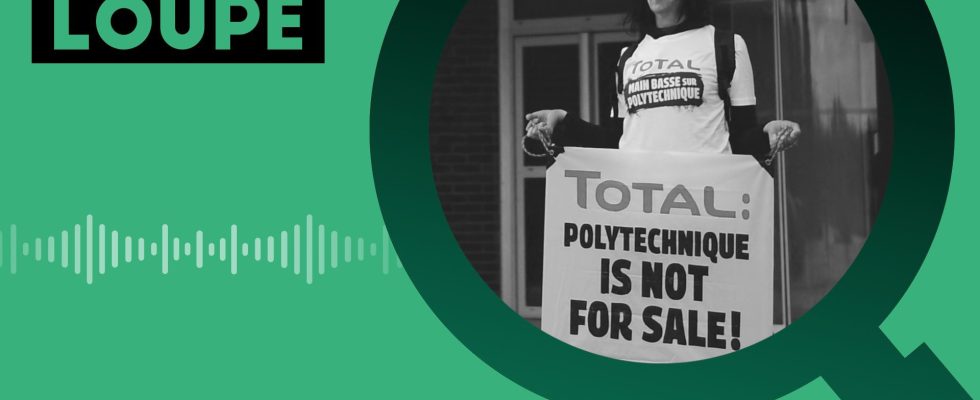In this episode of La Loupe, Xavier Yvon deciphers the positions of universities and schools on fossil fuel companies with Valentin Ehkirch, journalist specializing in Ecological Transition at L’Express.
Listen to this episode and subscribe to La Loupe on Apple Podcasts, Spotify, Deezer, Google Podcasts, Podcast Addict And Amazon Music.
The team: Xavier Yvon (presentation), Margaux Lannuzel (writing), Charlotte Baris (editing), Jules Krot (directing) and Marion Galard (work-study).
Credits: Youtube channel “diverting talents”
Music and dressing: Emmanuel Herschon/Studio Torrent
Picture credits: Martin Bureau/AFP
Logo: Anne-Laure Chapelain/Benjamin Chazal
How to listen to a podcast? Follow the leader.
Xavier Yvon: It’s been a long time since I started an episode of La Loupe by opening our good old dictionary. I know, we could look up the definitions on the internet when we need them. But let’s say it’s our somewhat “old school” side.
So I’m turning the pages… D, E, F. We’re getting closer… Flamand, abound… That’s it! Fossil.
“Adjective and masculine noun”, there are two meanings. I read them to you. The first: “Debris or imprint of a plant or animal, buried in the rock layers prior to the current geological period, and which are preserved there”. We are really in pure and hard archeology… And the second meaning is much shorter: “old and ossified, considered archaic”.
After the definitions, the adjective is presented alongside the words with which it is often associated. I’m going to read you just one example: “fossil fuels”, “fuels that were formed millions of years ago (coal, oil, natural gas), and which provide so-called fossil energy.”
I close the dictionary and you can imagine: we have already taken a big step towards our theme of the day. In today’s episode, I suggest that you take a closer look at the links between so-called fossil fuel companies and French universities, that is to say the place where the future is being prepared – and especially the ecological transition. In other words, I suggest that we ask ourselves this question: is the training of young people compatible with industries considered “archaic and sclerotic”?
For further
PODCAST. Climate: the advantages (and challenges) of European legislation
PODCAST. Who should pay for “reparations” for climate disasters?
Polytechnique: “the LVMH affair” revives the quarrels around the vocation of the school
Record profits of TotalEnergies: these questions that are likely to catch up with the oil giant
